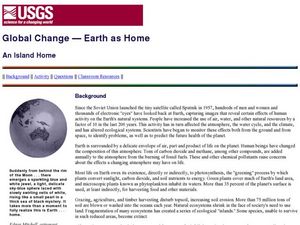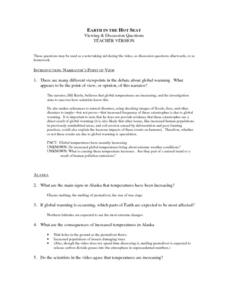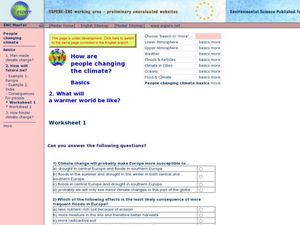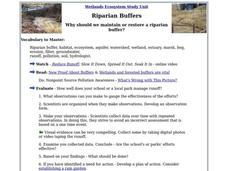Curated OER
Global Change- Earth as Home
Students create their own environment. In this environmental protection lesson, students pretend they are the owners of a tropical island. They create jobs for the citizens and develop the island as a model environment.
Curated OER
Renewable vs. Non-Renewable Resources
Fifth graders are introduced to the important topic of renewable, and non-renewable, resources. They are expected to be able to correctly categorize different types of resources as renewable or non-renewable. Another emphasis of this...
Curated OER
Rain Forest Rally
Eighth graders study tropical and temperate rainforests. In this rainforest lesson students complete a lab activity using the Internet.
Curated OER
Tree Inventory and Map Project
In this tree inventory and map project worksheet, students follow the directions on how to take inventories of trees and create a map from it. Students follow 4 sets of directions.
Curated OER
Lesson 2: Timber Harvesting Methods and Logging Methods
Whereas very few learners study this topic, this lesson plan is written well! An organized and detailed teaching outline explains thinning, clearcutting, seed tree, and shelterwood methods of harvesting timber. Beautiful diagrams can be...
Curated OER
Renewable vs. Non-Renewable Resources
Here's a fine lesson on renewable and non-renewable sources of energy for your 5th graders. In it, learners list a number of natural resources on the board, then try to sort the resources into appropriate categories. This helps them to...
Curated OER
Stream Ecology In Wisconsin and Puerto Rico
Students identify the different types of water and explain in what proportions they exist on Earth. They identify and correctly label the parts of the water cycle and how these parts interact with each other. Students identify the...
Curated OER
Earth in the Hot Seat
Middle schoolers identify the different viewpoints on the issue of global warming. While watching a video, they take notes on the issues presented to them and answer questions about what Alaska, Peru and East Africa are doing to prevent...
Curated OER
Renewable vs. Non-Renewable Resources
Fifth graders, after brainstorming why conservation of resources is important, distinguish between renewable and non-renewable resources. They make a list of different types of natural resources on the board and then sort them into two...
Curated OER
How are People Changing the Climate: Basics
In this climate change worksheet, students answer a series of questions about climate change. Students have multiple choice options for six online quiz questions
Curated OER
Mangrove Ecology and Adaptations
Students create a plant or animal that would be well adapted to a habitat they selected. They first learn about Mangroves and their specific adaptations that help them survive in their habitat.
Curated OER
Mangrove Ecology & Adaptations
Young scholars creat a plant, animal, or other living organism that would be well adapted to a habitat that they previously selected. First they learn about adaptations of Mangroves.
Curated OER
Renewable vs. Non-Renewable Resources
Fifth graders identify renewable vs. non-renewable resources and comprehend why conservation of resources is important. They are asked what they think the words natural and resource mean. Pupils then put the words together to define...
Curated OER
Riparian Buffers
In this riparian buffer worksheet, students click on the links to learn about why we should maintain the riparian buffer and answer short answer questions about it. Students answer 7 questions.















